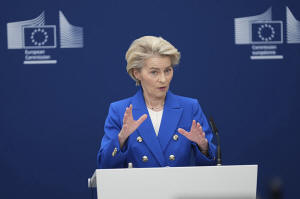EU ponders 800 billion euro plan to beef up defenses to counter possible
US disengagement
[March 04, 2025]
By RAF CASERT
BRUSSELS (AP) — The chief of the European Union's executive on Tuesday
proposed an 800 billion-euro ($841 billion) plan to beef up the defenses
of EU nations, aiming to lessen the impact of potential U.S.
disengagement and provide Ukraine with military muscle to negotiate with
Russia following the freeze of U.S. aid to the embattled nation.
European Commission President Ursula von der Leyen said the massive
“REARM Europe” package will be put to the 27 EU leaders. They are
holding an emergency meeting in Brussels on Thursday following a week of
increasing political uncertainty from Washington, where President Donald
Trump questioned both his alliance to the continent and the defense of
Ukraine.
“I do not need to describe the grave nature of the threats that we
face," von der Leyen said. Her plan had already been in the works before
Trump's decision early Tuesday to pause military aid to Ukraine.
Key to the quandary of EU nations has been an unwillingness to spend
much on defense over the past decades as they hid under the U.S. nuclear
umbrella and were hurt by a sluggish economy, which creates challenges
for a quick ramp-up of such spending. It increasingly has left them on
the world's diplomatic sidelines.
How it would work
Most of the money Von der Leyen is talking about, would come from
loosening the fiscal constraints the EU puts on budgetary spending to
“allow member states to significantly increase their defense
expenditures without triggering” punishing rules aimed at keeping
deficits from going too far into the red. It would help member states to
spend on defense without being forced to cut into social spending purely
to keep within EU rules.

“So if member states would increase their defense spending by 1.5% of
GDP on average, this could create fiscal space of close to 650 billion
euros ($683 billion) over a period of four years,” von der Leyen said.
This would be topped up by a loans program, controversially backed by
the common EU budget, of 150 billion euros ($157 billion) to allow
member states to invest in defense.
She said military equipment that needs to be improved includes air and
missile defense, artillery systems, missiles and ammunition, drones and
anti-drone systems and cyber preparedness.
Such a plan will force many EU member states to greatly increase their
military spending, which is still below 2% of gross domestic product.
NATO Secretary-General Mark Rutte has told the member states they need
to move to more than 3% as quickly as possible.
The plan will now be the blueprint for Thursday's summit, although
immediate decisions beyond strong commitments were unlikely.
[to top of second column]
|

European Commission President Ursula von der Leyen speaks during a
media conference on the defense package at EU headquarters in
Brussels, Tuesday, March 4, 2025. (AP Photo/Virginia Mayo)

Von der Leyen hopes her plan will aid Ukraine
Von der Leyen said her plan would also help Ukraine as it struggles
now, especially with any joint purchase of military materiel. “With
this equipment, member states can massively step up their support to
Ukraine," she said.
Such measures are all the more essential since President Donald
Trump directed a “pause” to U.S. assistance to Ukraine as he seeks
to pressure Ukrainian President Volodymyr Zelenskyy to engage in
negotiations to end the war with Russia. In sharp contrast, the EU
has always said that it wants Zelenskyy to negotiate from a position
of strength, necessitating more arms for Kyiv, rather than less.
Washington's move came just days after a disastrous Oval Office
meeting in which Trump tore into Zelenskyy for what he perceived as
insufficient gratitude for the more than $180 billion the U.S. has
appropriated for military aid and other assistance to Kyiv since the
start of Russia’s invasion on Feb. 24, 2022.
In Europe, Trump's move was also seen as yet more proof it could no
longer count on the trans-Atlantic alliance that has been the
bedrock of geopolitics since World War II.
“Some of our fundamental assumptions are being undermined to their
very core,” von der Leyen wrote to EU leaders ahead of Thursday's
summit. “The pace of change is disconcerting and increasingly
alarming.”
EU leaders hope Hungary won't scuttle agreement
Within the EU, unanimity is often necessary for agreements on
international affairs and Ukraine, and Hungarian Prime Minister
Viktor Orbán has often kept the 26 other member states back.
Over the weekend, Orbán already indicated in a letter that he would
oppose draft conclusions that center on the defense of Ukraine and
its place at the negotiating table. But summit host and EU Council
President Antonio Costa is hopeful that on common defense, Orbán
will not play the spoiler.
In a letter to Budapest, a copy of which was obtained by The
Associated Press, Costa wrote that “Regarding European defense, I
welcome the fact that no objections are raised in your letter. There
appears to be broad agreement on the need for Europe to become more
sovereign, more capable and better equipped.”
All contents © copyright 2025 Associated Press. All rights reserved |